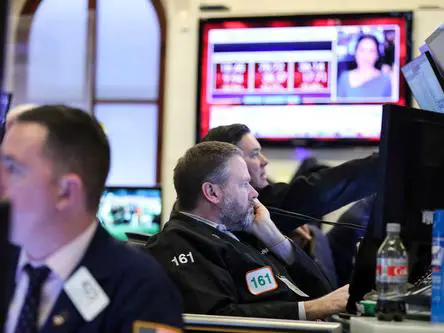U.S. equities posted huge weekly losses for the week ended Feb. 28, as investors fled the stock market and flocked into safe-haven assets amid risk-averse sentiment.
For the week, the blue-chip Dow plunged nearly 3,600 points, or more than 12 percent. The broader SP 500 and the Nasdaq both declined more than 10 percent.
Analysts have said that investors were panicked amid concerns over the potential economic impact of COVID-19.
The Cboe Volatility Index, widely considered to be Wall Street's fear gauge, hit a high of 49.48, its highest level since February 2018.
The 10-year Treasury yield continued to plunge on Friday, hitting fresh record low at around 1.156 percent. Yields move inversely to prices.
In addition, the yield on the 10-year note dropped further below that of the three-month bill on Thursday.
Paul Ashworth, chief U.S. economist at Capital Economics, said the recent re-inversion of the Treasury yield curve and the sharp sell-off in equities have reignited fears that the U.S. economy is about to be plunged into a recession.
Weak data also weighed on the market.
U.S. initial jobless claims, a rough way to measure layoffs, registered 219,000, an increase of 8,000 from the previous week's revised level, the Labor Department said Thursday. Economists polled by the MarketWatch had expected claims to total 214,000.
U.S. gross domestic product increased at an annual rate of 2.1 percent in the fourth quarter in the second estimate, unrevised from an advance estimate, the U.S. Commerce Department reported Thursday.
U.S. consumer confidence rose less than expected in February.
The Conference Board Consumer Confidence Index came in at 130.7, up from 130.4 in January.
The Present Situation Index, which is based on consumers' assessment of current business and labor market conditions, decreased from 173.9 to 165.1, according to a report released by The Conference Board.
UBS Global Wealth Management's Chief Investment Officer Mark Haefele said in a note that if Europe or North American nations were to impose aggressive containment measures, it could mean materially lower economic growth in the first half of the year, and require offsetting actions from monetary and fiscal authorities to prevent a prolonged downturn.
Analysts from MRB Partners said they do not expect the global economy to stumble into recession, but cautioned investors to "be prepared for a volatile, and periodically difficult, next few months."
U.S. Federal Reserve Chairman Jerome Powell said in a statement on Friday afternoon that while the fundamentals of the U.S. economy remain strong, the coronavirus poses evolving risks to economic activity.
He added that the central bank is closely monitoring developments and their implications for the economic outlook.
"We will use our tools and act as appropriate to support the economy," Powell said.
The major indexes pared losses immediately after Powell's statement but soon dipped deeper. The losses were cut again a few minutes before market close on Friday.
Investors saw a higher probability for further rate-cuts from the Federal Reserve amid potential economic impact of the coronavirus.
The current federal funds rate target range stands at 1.5 percent to 1.75 percent. Market expectations for a 25-basis-point rate cut in March sat at 57.2 percent, according to the CME Group's FedWatch tool. Expectations for a 50-basis-point rate cut in March was at 42.8 percent.
 简体中文
简体中文

